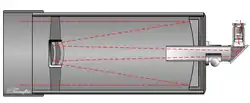Klevtsov–Cassegrain telescope
The Klevtsov–Cassegrain telescope is a type of catadioptric Cassegrain telescope that uses a spherical primary mirror and a sub-aperture secondary corrector group composed of a small lens and a Mangin mirror.

Design

In the Klevtsov-Cassegrain, all of the optical surfaces are spherical or near-spherical.[1][2] The secondary Mangin mirror (M 2 ) and the meniscus corrector (C) are held in place by a spider vane and the front of the telescope tube is otherwise open.
These types of telescopes have the disadvantage of the spider, which holds the corrector, causing diffraction artifacts[3] and, since multiple surfaces are involved, achieving good aberration correction can be very complex.[4]
This design was originally envisaged by G. I. Popov with a practical implementation by Yuri A. Klevtsov. Commercial manufacturers of the design include Novosibirsk TAL and Vixen.
References
- New optical systems for small-size telescopes (abstract)
- New optical systems for small-size telescopes Archived 2009-05-23 at the Wayback Machine
- Diffraction effects of telescope secondary mirror spiders on various image-quality criteria
- - Vladimir Sacek, telescope-optics.net, Notes on AMATEUR TELESCOPE OPTICS, CATADIOPTRIC TELESCOPES, 10.2.1